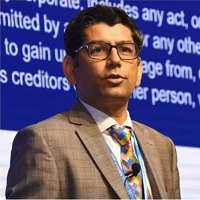The special AML/CFT Webinar Series jointly organized by ABA and Fintelekt Advisory Services was successfully held on March 26, 2020. Focusing on ““Managing AML Risk, Operations and Continuity during the COVID-19 Pandemic“, the webinar drew the interest of over 200 bankers from 21 countries and territories all over the world.
![]() The webinar moderated by Shirish Pathak, Managing Director of Fintelekt, featured two expert speakers: Guy Sheppard, Head of Asia-Pacific Financial Crime, Intelligence and Cyber at SWIFT; and Suveer Khanna, Partner – Forensic Practice, at KPMG India. The interesting conversation, held over a 60 minutes period, elaborated on operational issues such as dealing with expected and unanticipated disruptions, staffing challenges and potential technology disruptions due to the pandemic.
The webinar moderated by Shirish Pathak, Managing Director of Fintelekt, featured two expert speakers: Guy Sheppard, Head of Asia-Pacific Financial Crime, Intelligence and Cyber at SWIFT; and Suveer Khanna, Partner – Forensic Practice, at KPMG India. The interesting conversation, held over a 60 minutes period, elaborated on operational issues such as dealing with expected and unanticipated disruptions, staffing challenges and potential technology disruptions due to the pandemic.
Mr. Pathak also brought into discussion potentially related risks to the current Covid-19 pandemic, the possibility of more fraud, further regulatory demands, the monitoring and balancing risks within banks, and the probable shift of mindshare to credit risk over AML demands.
Among the many issues discussed, Guy Sheppard said that as the Covid-19’s infection rate varies from country to country, now is the proper time to implement Business Continuity Plans (BCP). However, he emphasized that the challenge forward is unknown and an economic slowdown should be expected.
Guy Sheppard also indicated that under the current situation, banks are operating “to keep the lights on” so a flexible or lenient regulatory approach is needed under trying conditions. However, by Q3 and Q4 of 2020, some new regulatory initiatives must be expected.
For his part, Suveer Khanna expected a significant rise of scams related to Covid-19. Thus, he recommended that banks implement internal and external training to face these news threats, especially now that banks are rotating personal between home and office.
Khanna added that advanced technology solutions and operational resilience should accompany customers’ development because clients are changing their behavior due to policies demanded to face Covid-19.
Also, he argued that at this time banks also need to collect data and model the impact of the new situation. Customer awareness is critical during this period. Suveer Khanna further added that organizations are not totally prepared. We are all being tested by new circumstances.
Thus, vigilance against more cyber intrusions, email phishing, Covid-19 update scams, and update contingency plan scams, should be reinforced. Criminals are using a new front to attack banks.
Suveer Khanna explained that this is the time to update Disaster Recovery Programs and increase investment in technologies that impact the customer, expand bandwidth while keeping privacy and security alertness during remote operations, as customers and bank employees will start working remotely more often.
At the conclusion of the webinar, Guy and Suveer both agreed that the bank business will be under pressure. However, AML compliance should not be relented as sanction risks and money laundering’s regulatory demands remain severe.
For those interested in viewing the video presentation of the webinar, the ABA Youtube channel is HERE.
SUMMARY
Many of the key ideas presented during the session for AML compliance officers are summarized as follows:
- AML teams at most banks are working by rotation or working from home. Many of the teams are operating at reduced staff strength due to limitations with infrastructure.
- Most banks have a business continuity plan (BCP) in place, which is being invoked at this time. However, adequacy of these plans will be put to test in the current scenario. Further, it is likely that the true extent of challenges is not yet known.
- There is a sudden spurt in financial crime typologies especially in retail banking in areas such as cyber frauds and email phishing, and in capital markets in areas such as insider trading.
- There is likely to be an increase in money laundering risks in areas such as human trafficking, smuggling, and organized criminal activities.
- A holistic response to the COVID-19 situation is required, that involves internal and external training and awareness initiatives, control effectiveness management approaches, communications and operational resilience responses.
- Regulatory reporting will be more challenging for banks due to the disruptions. Many banks may be dealing with backlogs in transactions monitoring and regulatory reporting. Cost of reporting is also likely to be higher due to the disruptions, delays in querying, etc.
- Regulators are showing more flexibility and are making themselves available for communication if financial institutions are facing any delays or other problems due to the pandemic situation. However, banks should not expect extensions on reporting obligations and timelines.
- The focus in many banks will shift to survival and on growing the topline. In the face of rising defaults and disruptions in most industries, credit risk is likely to get much more attention, leading to shifts in risk appetites of banks and in the profile of customers onboarded in the future.
- There will be pressure on compliance to downplay risks or red flags in order to maintain customer relationships. Discretionary AML spending may also be impacted in the near future.
- AML compliance officers should ensure that financial crime risks are an integral part of the organisational risk strategy going forward. AML should maintain a hard line when it comes to sanctions risks or obvious money laundering red flags, as lapses in these areas could lead to heavy regulatory penalties.
- When business returns to normal, an audit and review of preparedness during the pandemic should be carried out and learnings should be applied to business continuity planning for the future.
- The impact of the pandemic may result in greater comfort with remote operations and employees working from out of office in future too. Reviews of access and privileges, managing sensitive data or systems may be carried out to accommodate this change.
- The next webinar on Sanctions is planned for May 6, 2020.
FEATURED SPEAKERS
 Guy Sheppard
Guy Sheppard
Head of Asia-Pacific Financial Crime, Intelligence and Cyber
SWIFT
 Suveer Khanna
Suveer Khanna
Partner – Forensic Practice
KPMG
 Shirish Pathak
Shirish Pathak
Managing Director
Fintelekt Advisory Services
(Webinar Moderator)


Leave a Reply